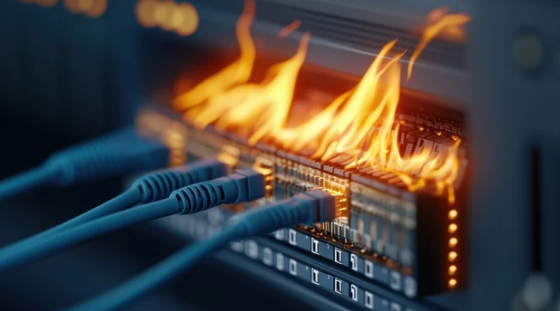The internet has become the backbone of modern life—powering everything from remote work and online learning to gaming and streaming. Yet, many people still struggle with common internet problems like slow speeds, frequent disconnections, poor Wi-Fi coverage, and NAT type errors. The good news is that most of these issues are preventable with a few simple steps.
In this guide, we’ll break down the top internet problems you can avoid and the best tips to ensure your connection stays fast, stable, and frustration-free.
1. Slow Internet Speeds
Few things are more annoying than buffering videos or sluggish downloads. Slow speeds usually happen because of outdated equipment, network congestion, or too many background apps eating up bandwidth.
How to Prevent It:
- Upgrade to a modern router that supports higher speeds.
- Limit unnecessary background apps or downloads.
- Use wired Ethernet connections for bandwidth-heavy tasks.
- Check with your ISP to ensure you’re on the right speed plan.
2. Weak Wi-Fi Signals
Dead zones or weak Wi-Fi coverage are common in large homes or areas with thick walls. This problem makes video calls drop or gaming nearly impossible in certain rooms.
How to Prevent It:
- Place your router in a central, elevated location.
- Avoid hiding the router in cabinets or behind furniture.
- Use Wi-Fi extenders or a mesh system to boost coverage.
- Keep the router away from interference sources (like microwaves or cordless phones)
3. Frequent Disconnections
If your internet drops randomly throughout the day, it can ruin remote work, calls, or online gaming sessions. This is often caused by outdated firmware, overloaded routers, or poor cabling.
How to Prevent It:
- Update your router’s firmware regularly.
- Restart your router once a week to refresh the connection.
- Replace damaged or old Ethernet cables.
- Avoid connecting too many devices at once.
4. NAT Type Problems in Gaming and VoIP
NAT (Network Address Translation) issues are a nightmare for gamers and VoIP users. A Strict NAT can block multiplayer matchmaking, voice chats, or online calls.
How to Prevent It:
- Enable UPnP in your router settings.
- Use port forwarding for specific apps and games.
- Assign a static IP address to your console or PC.
- Avoid double NAT setups by setting one router to bridge mode.
5. High Latency (Lag)
Lag can ruin a competitive game or a business call. High latency usually occurs because of network congestion, poor routing, or Wi-Fi interference.
How to Prevent It:
- Use wired connections for latency-sensitive tasks.
- Enable Quality of Service (QoS) to prioritize real-time traffic.
- Limit streaming or large downloads while gaming or on calls.
- Choose servers closer to your location when possible.
6. Security Vulnerabilities
An unsecured network doesn’t just slow you down—it puts your privacy at risk. Hackers can steal data, hijack bandwidth, or even take control of your devices.
How to Prevent It:
- Use strong Wi-Fi passwords with WPA3 or WPA2 encryption.
- Disable remote access features if you don’t need them.
- Keep all connected devices updated.
- Regularly check your router’s device list to spot intruders.
7. ISP-Related Restrictions
Sometimes, the problem isn’t your setup but your internet provider. Some ISPs enforce bandwidth throttling, strict NAT policies, or outdated equipment, making it hard to enjoy a smooth connection.
How to Prevent It:
- Contact your ISP and request a public IP address if you’re stuck with CGNAT.
- Negotiate a plan that fits your usage needs (gaming, streaming, remote work).
- Consider switching to a more reliable provider if problems persist.
8. Outdated Equipment
Using a router or modem that’s more than five years old can limit your internet speed, range, and reliability.
How to Prevent It:
- Upgrade to a modern router with Wi-Fi 6 for better performance.
- Replace outdated Ethernet cables with Cat6 or higher.
- Use ISP-approved modems to ensure compatibility.
Conclusion
Most internet problems are not random—they’re the result of preventable issues like weak Wi-Fi placement, outdated equipment, or poor configuration. By applying these simple tips, you can avoid:
- Slow speeds and buffering
- Weak Wi-Fi signals
- Random disconnections
- Gaming and VoIP NAT issues
- Lag during online activities
- Security risks
Taking a proactive approach not only keeps your internet fast, stable, and secure but also saves you from endless frustration. Whether you’re working from home, gaming online, or streaming your favorite shows, a well-maintained network makes all the difference.
Also Read :
